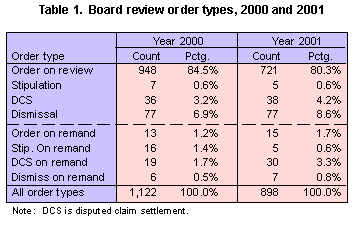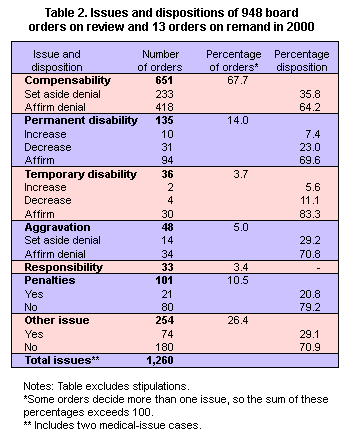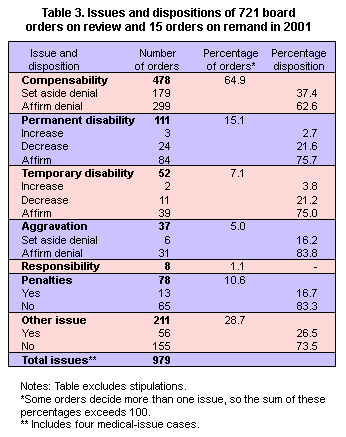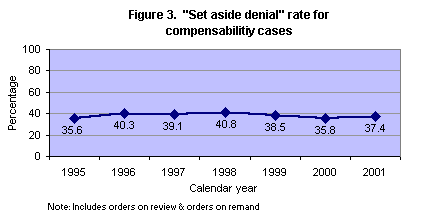
by Russ Reed
Note about procedure change
Prior to 2000, original board-review orders were analyzed according to the type of original order (e.g., order on review, a board decision on the merits) and as of the date of that order. This practice was done even though (1) about 2 percent of board orders are reversed and remanded by the court, (2) the dispositions of issues can change on reconsideration and on remand, and (3) even the type of order can change (e.g., after an order on review, the board approves a settlement on reconsideration or on remand from the court).
In the new procedure, cases pending court review and cases pending board review after remand by the courts are not analyzed until there is a final decision. Original board orders not appealed to the court are analyzed as of the date of the original order or, if changed on reconsideration, as of the date of the reconsideration order. Original orders affirmed or dismissed by the court are analyzed as original board orders, but the order date (for the analyses in this report) is considered to be the date of the court’s action. When the court reverses and remands to the board, the case is analyzed as “on remand” and the date is considered to be the date of the board’s on-remand order.
This procedure change allows us, when there are changes to the type of order or to the disposition of issues on reconsideration or on remand from the court, to correctly analyze the type of order resolving the case and the final disposition of the issues. It does not affect counts of requests and orders (in the first two paragraphs below), nor time lags for original board-review orders. The affects of this change on other types of analysis are not large because there are many more original board orders than on-remand orders. Table 1 gives counts and percentage frequencies of order types, as determined by the new analysis procedures.

Requests
In 2000 and 2001 there were 1,076 and 966 (respectively) requests for Oregon Workers’ Compensation Board review of decisions by the board’s Hearings Division. That’s about 5.7 and 10.2 percent fewer requests each year, compared to the previous year. The worker was the appellant in 54.6 and 54.5 percent of the cases.
Orders
The board issued 1,166 and 860 orders during 2000 and 2001, respectively, 1.7 percent more and 26.2 percent fewer than the previous year. See Figure 1. These figures include remands to the Hearings Division, but they exclude reconsideration orders, orders on remand from the courts, third party cases, and crime victim cases. In 2000 there were 8 third party cases and no crime victim cases, while in 2001 there were 4 third party cases and 1 crime victim case. The data below, except Figure 1, exclude board remands to the Hearings Division and cases not directly dealing with worker claims. Also, board own motion orders and claim disposition agreements are not considered here; information about them is available in separate reports.

 |
 |
The breakout of original board-review orders by order type, for 2000 and 2001, respectively, were as follows: orders on review, 90.3 and 86.5 percent; stipulations (including disputed claim settlements), 3.3 and 4.3 percent; and dismissal, 6.4 and 9.3 percent.
Insurer
SAIF was the insurer in 26.6 and 28.4 percent of the cases in 2000 and 2001, respectively.
Issues
Tables 2 and 3, in the “percentage of orders” column, give issue relative frequencies for orders on review and orders on remand. Figure 2 gives historical information on the numbers of compensability disputes. The percentages of 2000 and 2001 order on review and order on remand cases with the compensability issue (67.7 and 64.9 percent) were the highest and second-highest on record, respectively. Compensability includes whole claim denial and partial denial. The year 2000 percentages of cases with the issues of permanent and temporary disability (14.0 and 3.7 percent, respectively) were the second- and third-lowest on record. The percentages with aggravation (5.0 percent each year) were record-low values. The percentage of cases with the penalty issue, near 10.5 percent each year, was typical of the past two years but lower than all 1985-1997 values.
Issue dispositions
Tables 2 and 3, in the right column, give issue dispositions for orders on review and orders on remand. Figure 2 gives historical counts of compensability issues by disposition, while Figure 3 depicts the rates at which denials are set aside. (“Set aside denial” is the reversal of an insurer denial; it may reverse or affirm a hearings administrative law judge’s decision.) The percentages of year 2001 extent of permanent and temporary disability cases granting an award increase (2.7 and 3.8 percent) were the lowest and second-lowest on record, respectively. The aggravation “set aside denial” rate in 2001 was the lowest value on record. Also, the penalty “yes” rate in 2001 was the second-lowest on record.


Permanent disability
The board in 2000 and 2001, respectively, issued 142 and 116 orders on extent of permanent disability, including stipulations. For orders on review and orders on remand, dispositions are given in tables 2 and 3 and are discussed above. For all order types, dispositions were as follows (for 2000 and 2001, respectively): affirm, 68.3 and 75.9 percent; decrease award, 23.9 and 20.7 percent; and increase award, 7.7 and 3.4 percent.
Average permanent partial disability decreases in 2000 were 16.3 scheduled degrees, 33.8 unscheduled degrees, and 25.8 degrees combined. For 2001, these values were 18.4, 51.1, and 36.1 degrees. Total net PPD awarded (the sum of all increases, minus the sum of all decreases) was a net decrease each year: $163 thousand in 2000 and $166 thousand in 2001.
There was one 2000 board order affirming a hearings judge’s decision to grant permanent total disability. (There was another case where the board rescinded a PTD award. It would be counted in 2000 by our new procedures, because the parties settled the case on remand from the court in 2000. However, this case was counted as a PTD rescind in both the 1999 board-review and permanent total disability reports, so we will not count it again.) There were no PTD grants by the board in 2000, and there were no orders about PTD in 2001.
Sanctions
In 2000 and 2001 combined, the board considered in 20 cases the issue of attorney sanctions for an appeal that was frivolous, made in bad faith, or for harassment purposes. (Data is not entered about this issue, but most cases are known due to reporting by board close-coding staff or from Web site searches.) Of these 20 cases, 1 was an appeal of a judge’s decision to deny sanctions, 2 were appeals of judges’ decisions to impose sanctions, 8 were employer or insurer requests for sanctions against claimant attorneys, and 9 were claimant requests. In each case, the board’s decision was to deny sanctions, so both hearing decisions to impose sanctions were reversed.
Hearing affirmations rates
For extent of disability, the rates are given in the tables (percentage disposition of “affirm”). For the issues of compensability, aggravation, and penalty, the rates (based on matching hearing and board-review cases) are 88.3, 76.5, and 71.4 percent (respectively) for 2000, and 87.3, 100, and 70.5 percent for 2001. (These rates for 1999 were 83.5, 81.8, and 57.9 percent.)
Based on the “affirm/reverse/modify” codes, 77.7 and 78.4 percent (respectively) of all 2000 and 2001 orders on review and orders on remand (combined) affirmed the administrative law judge on all issues (compared to 78.8 percent in 1999). About 12.7 and 11.5 percent reversed the judge, and 9.5 and 10.1 percent affirmed part of the judge’s order (A/R/M code of “modify”).
Disputed claim settlements
The board approved 55 and 68 DCSs in 2000 and 2001, respectively (includes original board orders, reconsideration orders, and on-remand orders). In these orders, in consideration for not contesting denials, insurers paid $706 thousand ($12,840 per case) in 2000 and $854 thousand ($12,550 per case) in 2001.
Time lags
The median times from board-review request to order on review were 120 days (3.9 months) for 2000 and 112 days (3.7 months) for 2001. These were the shortest times on record. The median times from court remand to board order on remand (excludes settlements and dismissals) were 29.5 days (0.97 months) in 2000 and 84 days (2.8 months) in 2001.
Attorney fees
The board directed payment of fees totaling $693,000 and $612,000 to attorneys representing injured workers in 2000 and 2001, respectively. Total fees in 2001 were the same as for 1999, as rounded. Average fees were $1,926 and $2,032, compared to $1,624 in 1999. In each of these two years about 74 percent of all fees were assessed against insurers (84 percent in 1999), just over 24 percent were taken from DCS consideration, and just over 2 and 1 percent (for 2000 and 2001, respectively) were out of worker compensation.
In addition to awarding claimant attorney fees, the board reduced hearing-awarded fees by $338,000 in 2000 (about 3.7 percent of 2000 hearing fees) and $295,000 in 2001 (about 3.4 percent of 2001 hearing fees). Most of these fee reductions were due to reversal of the judge on the primary issue, while some were due to successful challenges to the fee amounts.
If you have questions about the information contained in this document please contact by e-mail or phone: Russell Reed, Research Analyst, Research & Analysis Section, Information Management Division (503) 947-7343.
In compliance with the Americans with Disabilities Act (ADA), this publication is available in alternative formats by calling (503) 378-4100 (V/TTY).
This document was originally published in June 2003.
[Printed form: 440-2363(06/03/IMD)]